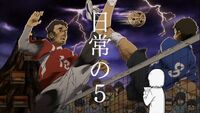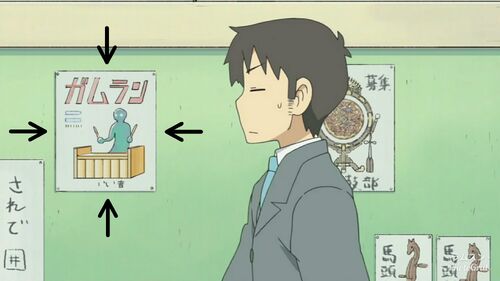There are tons of references related to Indonesian culture in the Nichijou series.
Sepak Takraw[]

Sepak takraw, Malaysia
In one episode Mio wakes up late because her alarm clocks not working. Looking for her mother, she finds a note by her mother saying that she's out playing sepak takraw (a traditional malaysian game). What flashes in Mio's mind shows her understanding of the sport. However, that might be the only thing she knows because she doesn't respond to Yukko's morning greeting which is Indonesian.
Reference to sepak takraw had been decided since Nichijou Prototype.
Indonesian[]
Bahasa Indonesia is a language used by Indonesians.
Selamat Pagi[]

Yukko says selamat pagi
Selamat Pagi (スラマッパギ Suramappagi), meaning Good Morning in Indonesian. This is Yukko's morning greeting. Yuuko's greeting is always blurry to Mio and Mai.
Selamat Malam[]

Mai says selamat malam
Selamat Malam (スラマッマラム Suramammaramu), meaning Good Night In Indonesian. Mai's response to Yukko's morning greeting.
Selamat Tinggal[]

Yukko says Selamat tinggal
In Indonesian, this means Goodbye. In Episode 7, Yukko, Mio, and Mai run towards a train that is about to depart. Yukko is the only one 'safe' while the other two look on from the other side of train door. Yukko says selamat tinggal (セラマーティンガ"ル" Seramattinga"ru") with the last consonant l pronounced as ru(ル). This fact reveals that Yukko is not that proficient in Indonesian.
Bear as Beruang (disputed)[]
There is a speculation about a(n) Indonesian pun in Episode 2, Part 5. So far, there has been no confirmation whether the pun was intentional and someone somehow saw it as a straight Japanese pun.
Note from GangBunTu:
While pocketing Mio's money, her elder sister said this phrase :
- Japanese : ある時はクマ、そしてまたある時は…ク-マ
- Romaji : aru toki wa kuma, soshite mata aru toki wa- ku-ma
- English translation : Sometimes I'm a bear, and other times I'm a be-ar.
- Indonesian translation : Kadang-kadang aku ialah beruang, dan kadang-kadang aku ialah ber - uang.
In Indonesian, bear is beruang, while (noting ク-マ = ku-ma → be-ar) it became Ber - Uang (Uang, pronounced similarly to "wang" which means "money"), which sounds oddly similar to "berwang", meaning "to have money".[1].
Putting these together, we'll have: "sometimes I'm a bear, other times I also have money".
Yoshino uttered the 2nd phrase at the time when she was pocketing Mio's money.
So, was the pun intentional or just a weird coincidence?
|
Bear as Have Money |
|---|
|
|
|
There are ugly debates in the comments section, kindly ignore them |
Gamelan[]
This Easter Egg was brought to light by user mikoo at animesuki forum. It appears in several forms throughout the series, like in episode 7 below:

The text in the marked poster is ガムラン (gamuran = Gamelan), one of the Indonesian's traditional musical instruments.
To be more precise, since there are lots of tribes in Indonesia, gamelan is a traditional musical instrument of Javanese and Balinese tribes.[2].
Soeharto[]
In the "Chic Things" segment in Episode 10, there is a man eating sushi with his bare hands who resembles Indonesia's second President, Soeharto.
 Soeharto in Nichijou. |
 Soeharto in Memoriam. |


